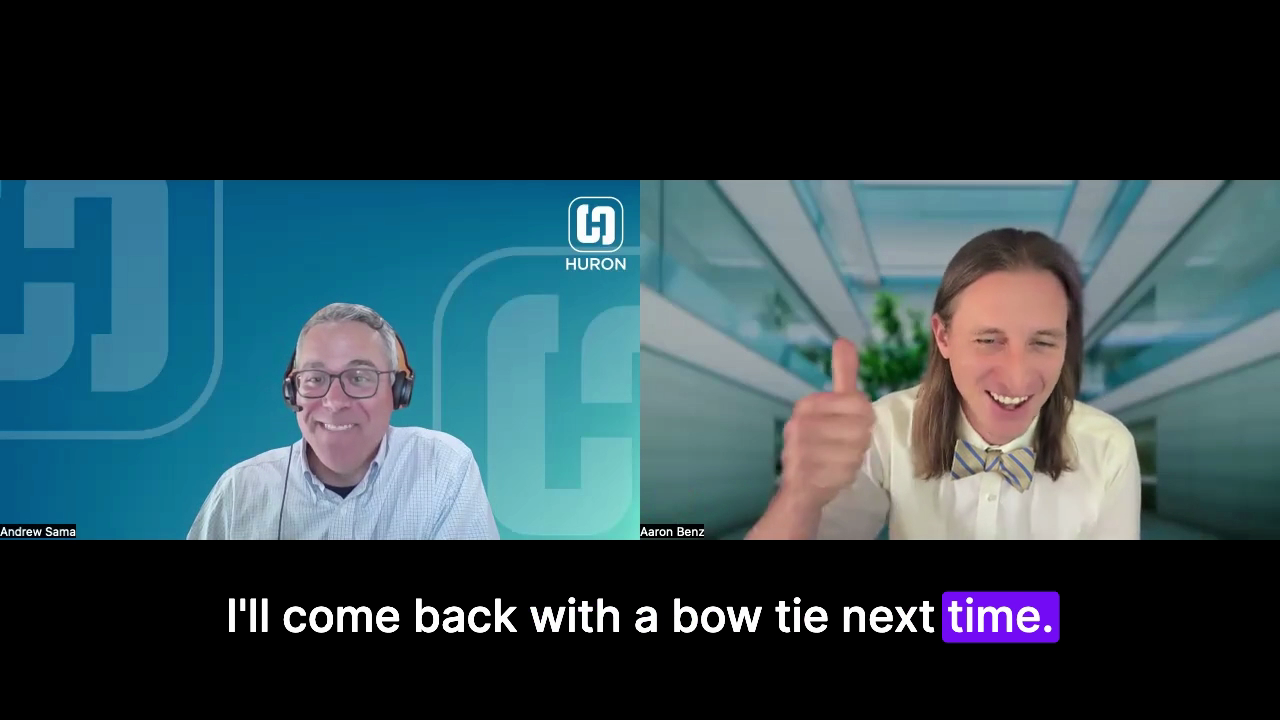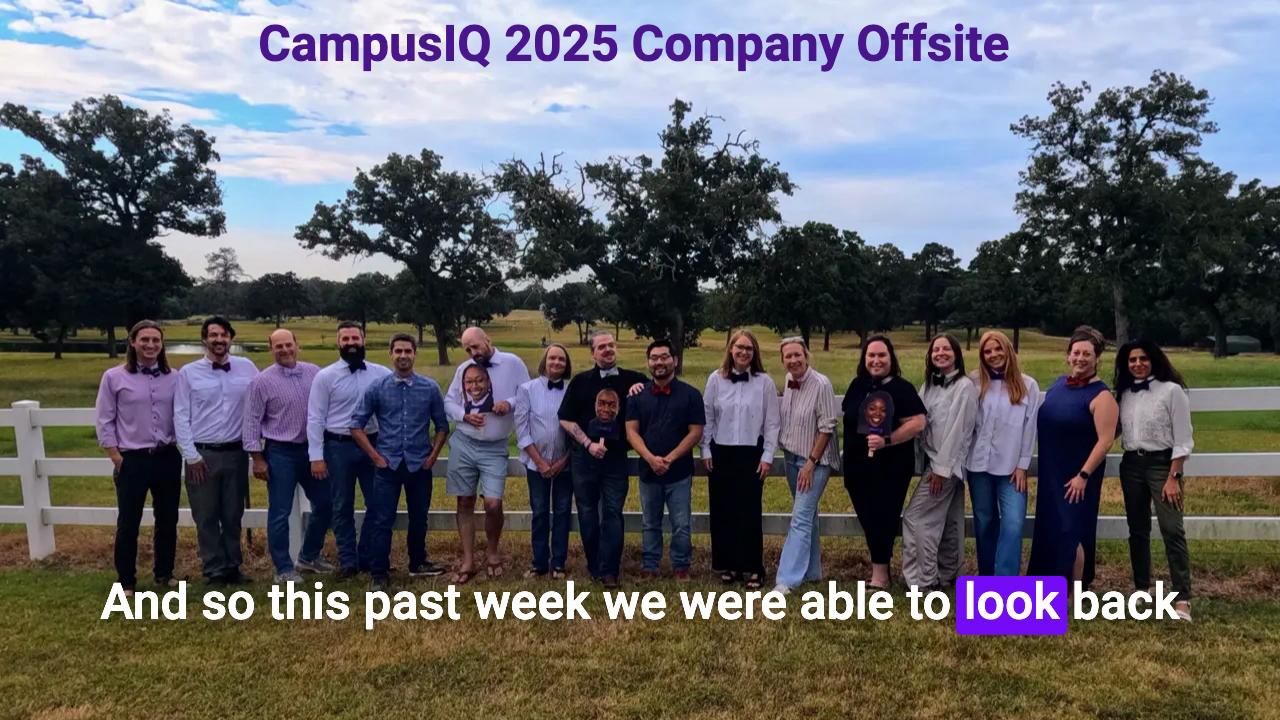Video Description
Campus policies and space use have changed dramatically since COVID, and leaders need more than anecdotes to decide what to do next. In this Bow Tie Tuesday conversation, CampusIQ and Huron’s Andrew Sama introduce a higher education space management survey that benchmarks what your peers are actually doing—policy updates, how remote-work rules tie to allocation, and whether inventories are growing or shrinking. The survey is intentionally light-lift (about 20–30 minutes) and focuses on trends and governance rather than hunting for spreadsheets. Why now? Construction costs and deferred maintenance are rising while many campuses report visibly under-used office space, creating pressure from boards and leadership to act. Real-time occupancy/facilities analytics help, but policy and change management matter just as much—hence the need for sector-wide benchmarks and practical case studies. Participants can opt in to receive an anonymized peer comparison report (e.g., by Carnegie class) to show where they’re leading, mid-pack, or behind. If you want better leadership conversations—grounded in what colleges and universities are doing today—this survey is a smart place to start.
Chapters
0:00 Why another space survey? (post-COVID shifts & WFH)
1:00 About Andrew Sama & campus experience
2:00 What the survey asks (policy links to allocation, inventory trends)
3:10 Why it matters: costs, deferred maintenance, empty offices
4:40 From data to action: utilization + governance + change management
6:10 What you’ll need (light-lift inputs)
7:00 Using benchmarks with leadership
8:00 What participants receive (anonymized peer report)
Full Transcript
[00:00:00]
Aaron: Ever wonder what your peer is doing in space management policy dealing with the times that have changed? Since COVID, lots of work from home agreements changing over time states getting people back in there. How good is your asset inventory? All the dynamics that we see are changing fast in furious today in 2025, and so it's why I'm so pleased on this Bow Tie Tuesday for Andrew Sama to be joining me.
Andrew, welcome to Bow Tie Tuesday.
Andrew: Thanks Aaron. Pleasure to be here.
Aaron: So I'm gonna have to ship you a bow tie so that the next time we do this, we're gonna be, we're gonna be both rocking bow ties, but but yeah, great to have you on.
Happy to do it. Would you just love giving from people who don't know you, just, you know, where you've been and, and kind of the industry, your, your roles before. And then we'll get to talk about this awesome survey that's been created.
Andrew: Yeah, Aaron. Uh, so for the last four years, uh, roughly I've been with, uh, Huron Consulting Group, uh, working directly with colleges and universities across the country on space and facilities issues.
But before that, uh, I spent [00:01:00] 13 years, uh, on campus at the University of Notre Dame, uh, where I helped establish the first centralized space management group, uh, at that institution. And so, uh, I've lived. The day-to-day of managing space, uh, on a college campus and all its complexities, uh, I know how hard it is, uh, and some of the challenges that my, uh, my former colleagues are facing.
And, uh, I'm excited to bring this survey to bear, to try to, uh, you know, with, with your help to try to help you know, folks understand where things are going in the industry and where things are working, uh, and where there's opportunities. So let's talk about it.
Aaron: So let's talk about the survey. So I'm sure a lot of people are like, great, another survey I gotta pull out.
Why does this one even matter? Right? So maybe let's start there. Like, why, why are we creating this other survey to collect data? Like what's the, either the core challenge problems or things we're trying to bring light to?
Andrew: Yeah. So, uh, understand survey fatigue for sure, right? But this one I think is not a big lift.
Let's start there. So it's asking you about trends, what's going on, when's, for [00:02:00] example, you know, when was the last time you updated your workplace space use policy? Does your workplace space use policy tie specifically? You know, the days of remote work to the type of allocation of space. It's questions like this that are getting at trends in the industry to help you as a space leader on your campus, facilitate conversations about where things are on your campus, where things are on peer's campuses, and maybe what some of the best practices are.
So, um, yes, it's another survey, but we think it's, it's targeting a niche that's not really being met at the moment, and it's not a big lift, right? So, uh, if you can spare 20 to 30 minutes of your time, we think the payoff is, uh, is tremendous in the way that it can support really important conversations about a very valuable resource on your campus.
Aaron: Right. I mean, I, I think it's fair to say the world's changed since COVID, right? And so all the policies that are being created are new, different legislations coming out that's new that might affect, you know, work workforce, but also just how, how students, faculty, staff are using campuses changing so [00:03:00] much.
Yeah. We have this whole new even, facility analytics and this new realm for some of the stuff that we do or others do. That's also just new, right? So there's so much new, new, new with also rising cost and all these other things that just have, we haven't always had. Right? There's these new problems and it's like, how do we help share for others and create a better community around what are other people doing?
Andrew: Yeah, that's exactly it, right? I mean, and, and let me back out even further then. You know, you, you just hinted at a few of the things that are going on, but, you know, I'll, I'll just mention that since 2019, right, uh, costs overall in the facilities realm are, you know, this would be campus construction costs up 20%.
Right is what we see in some of the studies that's on top of, you know, what we know from some of the great work at Gordian and other places, uh, is a really growing backlog of deferred maintenance, right? This is causing real pressure. You're starting to see this now on campuses where, you know, um, there's material impacts to the quality of space.[00:04:00]
And to the, and to, you know, the operations of space. Um, and that's happening in an environment now because of some of the changes you all alluded to, right? Around flexible work around, you know, remote learning. That some of, I've worked on lots of campuses in the last four years. I know you have too.
And I want to be clear, there's pros and cons, right? Or there's, there's good cases and some bad cases, right. But I walk through a lot of campuses where there's very empty office space. Yeah. Right? Mm-hmm. Um, and, you know, that's, that's putting real pressure on leadership.
Whether that's political, whether that's, uh, you know, governance from, from a board or something. There's, they're walking through campuses that are aging where there's big bills coming due, right? And they're not seeing usage, and that's creating real challenges and pressure, uh, that's coming to fruition for leadership on these campuses.
And so what do we do? Um, and I think this survey is a piece of how we get to some of those answers, right? I think the kind of work that you all do at CampusIQ um, you know, generating that real-time utilization data is another really important aspect of it, right? Um, and you know, [00:05:00] we at Huron can help with sort of taking action once you figure out what it is that you wanna do.
Right? Um, but I think it starts with understanding, you know, like a lot of things in higher ed benchmarking, what are the trends? What's working, what are my peers doing this survey is, is gonna get you going there.
Right. 'cause it, I mean it is more than just data, right? There's policy, there's change management, right?
Yeah. There's just so many dynamics that are, that are shifting. I know it's true for me, but like a lot of times, even in the same states, when we talk to some of these leaders, like they don't even know really what some of those other institutions are actually doing, especially on all these kinds of matters, right?
Maybe they have a meeting or catch up once a month or a quarter or a year, right? And so they have a little idea, and I think what's kind of brilliant about this is how do we start having better conversations and really seeing who's doing what and who's figured out something that's working. So I know another question that's gonna be asked though is okay. What data am I gonna go, need to look up or, or go and fill out all these, you know, all these questions that you're gonna ask.
Andrew: Yeah. I mean, [00:06:00] honestly you won't need to do much, right? Like I said, I, I would challenge you. I think there's gonna be a lot of folks, uh, who know their campuses decently well that can probably not open a spreadsheet and do this, right?
There's a couple questions at the start that ask you about how much gross square footage you have, you own and operate. Right. Um, once we get through that, honestly, it's not a lot of numbers, right? It's questions like, uh, is your inventory growing, shrinking, or staying the same? Um, you know, what kind of data points are you collecting? You know, what do your governance and policies, uh, look like around certain issues? Right? Um, we're asking a lot of questions that are meant to identify trends and surface issues. And we've got a number of places where you can input, free text answers, right? We're trying to surface those case studies of things that are working well and what are we hearing are, are consistently, you know, challenges across the industry at the end of the day. Right? Having sat in a space management chair on a campus myself, I was thinking about what did I need when I was in that chair.
And, and a lot of times what you need is some prompt to be [00:07:00] able to go to leadership and say, we need a change. One of the fundamental dynamics that we see that makes the management of space tricky on college campuses is that oftentimes the people who are day-to-day managing it, right? Folks in the facilities group, in the planning or space management group, right?
Even folks in the buildings they don't have full control of it. And so there's this interplay that has to go on between the folks who are, uh, you know, domain experts, if you will, around the use of space and how to, how to optimize and the people who are the end users of the space, right? The folks who are in it, teaching class, doing the work, right?
Yeah. And so to get that conversation going we think information like what would come outta this survey would be very helpful.
Aaron: Awesome. So I know another question and maybe the last question that, that people would be asking is, uh, okay, so what do I get for it, right? Yeah. So you wanna collect all this data.
Why, why should, okay, fine, it's 20 minutes fine. I don't need to look up really anything in my campus. Why would I participate in this? What, what do I get for it?
Andrew: So you can opt in, right? And I, [00:08:00] I don't know why anybody would opt out, but we, we, we have made it a, an optional, uh, thing. You can opt in to receive a summary report that'll give anonymized peer comparison.
So we'll protect the confidentiality. We, you know, we'll say things like, you know, this is an R1 or this is an R2, or something like that, but we're not gonna get into the specifics. Um, so it's anonymized data. Uh, and so you'll be able to see how your institution is stacking up. In terms of its governance model, in terms of the way it does strategy, in terms of its policy environment you know, and you'll have that report out to you that you can use for those, for those conversations.
Right? And you know, the more people that participate, uh, the better the dataset gets. Right? So take 20 minutes, fill this out, tell a friend. Uh, and you know, I think we can really do something to move the conversation forward for our higher education institutions. We, we've got to get this right.
This is one of the biggest you know, resources on any college campus behind the human capital is, is this facilities and space, uh, resource and institutions just under tremendous pressure to [00:09:00] manage it well. We want to help with that. We think we can do it. Let's do it.
Aaron: Yeah.
I mean, I would say at the end of the day, if you wanna know where you stack up, right?
Are you leading? Yeah. Are you in the middle of the pack? Are you behind on some issues? This is a great free way, right? Yeah. Where if you essentially donate 20 minutes of your time, all of a sudden you're gonna be able to get a report back that goes, here's where you're leading, here's where you're in the middle, here's where you're behind.
And then are able to make the decisions on your campus of, hey, is that, are we okay with this? Are we not okay with this? But ultimately have better leadership conversations.
Andrew: That's exactly it.
Aaron: Awesome.
Andrew: Very excited for it.
Aaron: Andrew, thank you so much for joining the special Bow Tie Tuesday. Always great talking with you.
Andrew: I'll come back with a bow tie next time.
Aaron: Fantastic.
Andrew: Alright.
Aaron: Fantastic. Thank you. Take care.





Comments (0)
Leave a Comment